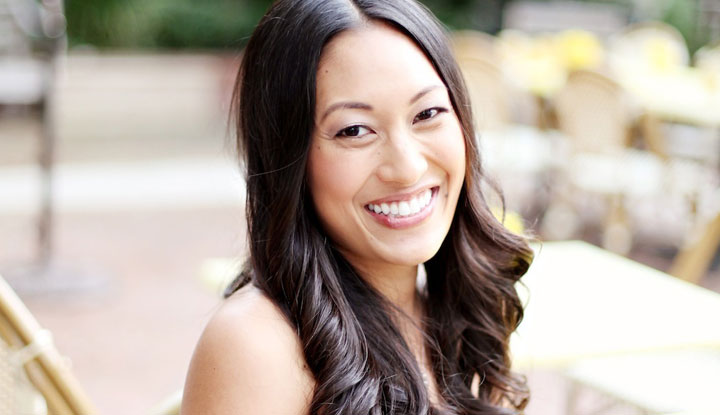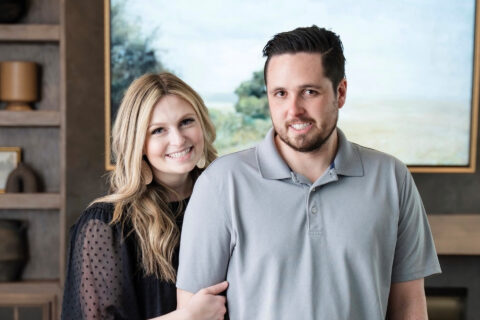So in March of 2011, I decided to put myself out there … I bought a domain name for a blog because I considered, “Maybe I’ll start blogging about some of the weddings and ideas I have…” It somehow caught on. I gained a lot of followers and it gave me the confidence to say, “I’m just going to do it!”
I ended up posting on Facebook, “Announcing Preppy Chic Events!” After that, friends [shared referrals] and that’s how I got my first six clients within a month – via social media. Social media was what really got my name out there. I am computer and tech savvy, so I used [social media] as my free marketing. Today, I pay for a couple of different sites to market my business, but other than that Preppy Chic Events gained momentum through word of mouth.
I never looked back, and all of a sudden I had a company.

A lot of it was a very personal struggle, in terms of “Am I disappointing my family …?” “Am I disappointing myself because I have these degrees – I’m throwing away my education? I should be doing finance or banking or something that is more in line with my educational [attainment].”
It was a really big struggle … to meet people who would ask me, “What do you do?” and I would reply “I own an event planning company.” They would say, “Didn’t you go to USC and get your MBA?”
Pivots, Expansion and Branding
[pullquote align=”right”]”I didn’t really know where I was going from the beginning. I’ve made a lot of pivots … I had this idea of what I was going to do, but it is completely different now.”[/pullquote]I didn’t really know where I was going from the beginning. I’ve made a lot of pivots. I realized I can’t just do weddings. Also, I didn’t ever think I’d have a co-founder or do destination weddings. I had this idea of what I was going to do, but it is completely different now.
For example, I’m opening up a partnership company in Maui to do high-end destination weddings. So my niche is evolving into luxury destination weddings – and that’s not where I started. I also never thought I’d be doing golf tournaments or become a blogger.
Now, looking back, I kind of regret the name I chose for my company because it’s such a niche name, but changing a business name when you’re already two years in is kind of difficult.
Best Success Story
As a joke, “100 percent of the couples [our clients] are still married!” So that’s a success. But, what was most surprising to me was that I was profitable within one year. Also the people I’ve met and the friends I have made – that has been a part of my personal success.
Biggest Startup Challenge
Figuring out pricing and niche was difficult. There are so many wedding planners out there, so differentiating myself and establishing a price point was the most difficult thing for me to do.
I found that my business background and network were my distinguishing factors.
I didn’t launch my company website until 2012 until my branding was what I wanted it to be; I started the blog in 2011. Most people just put something out there just to get “out there,” but I wanted everything to be cohesive so I spent a lot of money on hiring a web designer, developer and a branding consultant.
I decided that even though I was just getting started, I would attend one of the luxury wedding conferences (a very prestigious event). I was on the waiting list, and after pitching my story I was invited to attend. It was a big cost. But because of that, I met some of the best of the best who mentored me and shared great advice. That is how I figured out how to differentiate myself in the industry.
#1 Tip for Entrepreneurs
Know when to say “No!” Stay true to yourself. Know your value. Know your pricing. Understand your product. For example, I knew what I was bringing to the table and what was different from other [companies], so if [client’s] weren’t willing to pay [the price for my services], they probably weren’t the client’s I wanted.
I know my aesthetic, so if it doesn’t fit with my portfolio, I won’t accept it. I’m not going to accept something just to meet a bottom line; I accept [a client] because it’s a good fit. [I’ve learned how important it is to know your] core competencies and values and stick with them.
Connect with Stephanie on Twitter.
This interview has been edited and condensed. Interview conducted by writer, Katherine Burks.
© YFS Magazine. All Rights Reserved. Copying prohibited. All material is protected by U.S. and international copyright laws. Unauthorized reproduction or distribution of this material is prohibited. Sharing of this material under Attribution-NonCommercial-NoDerivatives 4.0 International terms, listed here, is permitted.

In this article
We eat, sleep and breathe entrepreneurship. We're behind YFS Magazine's fresh content -- one of the largest independent small business news sites. Young, Fabulous & Self-Employed has quickly become the definitive digital resource for startup, small business news and entrepreneurial culture. Join us on Twitter @yfsmagazine and Facebook.
Show More










